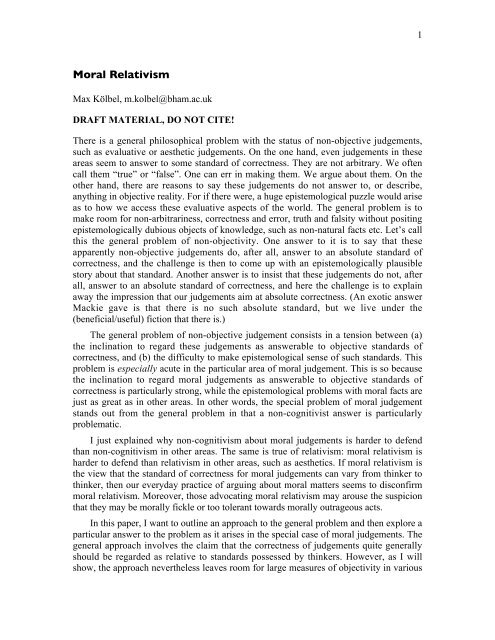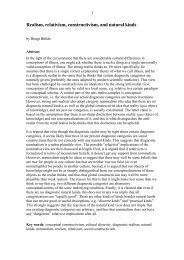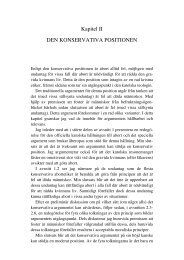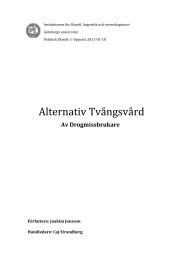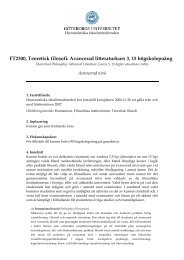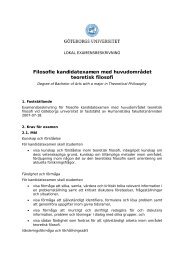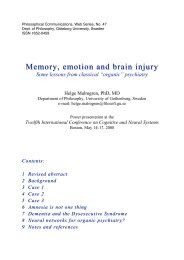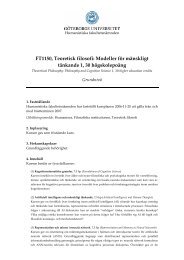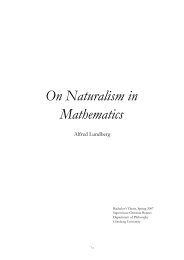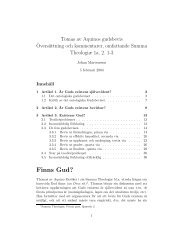Moral Relativism
Moral Relativism
Moral Relativism
- No tags were found...
Create successful ePaper yourself
Turn your PDF publications into a flip-book with our unique Google optimized e-Paper software.
1<strong>Moral</strong> <strong>Relativism</strong>Max Kölbel, m.kolbel@bham.ac.ukDRAFT MATERIAL, DO NOT CITE!There is a general philosophical problem with the status of non-objective judgements,such as evaluative or aesthetic judgements. On the one hand, even judgements in theseareas seem to answer to some standard of correctness. They are not arbitrary. We oftencall them “true” or “false”. One can err in making them. We argue about them. On theother hand, there are reasons to say these judgements do not answer to, or describe,anything in objective reality. For if there were, a huge epistemological puzzle would ariseas to how we access these evaluative aspects of the world. The general problem is tomake room for non-arbitrariness, correctness and error, truth and falsity without positingepistemologically dubious objects of knowledge, such as non-natural facts etc. Let’s callthis the general problem of non-objectivity. One answer to it is to say that theseapparently non-objective judgements do, after all, answer to an absolute standard ofcorrectness, and the challenge is then to come up with an epistemologically plausiblestory about that standard. Another answer is to insist that these judgements do not, afterall, answer to an absolute standard of correctness, and here the challenge is to explainaway the impression that our judgements aim at absolute correctness. (An exotic answerMackie gave is that there is no such absolute standard, but we live under the(beneficial/useful) fiction that there is.)The general problem of non-objective judgement consists in a tension between (a)the inclination to regard these judgements as answerable to objective standards ofcorrectness, and (b) the difficulty to make epistemological sense of such standards. Thisproblem is especially acute in the particular area of moral judgement. This is so becausethe inclination to regard moral judgements as answerable to objective standards ofcorrectness is particularly strong, while the epistemological problems with moral facts arejust as great as in other areas. In other words, the special problem of moral judgementstands out from the general problem in that a non-cognitivist answer is particularlyproblematic.I just explained why non-cognitivism about moral judgements is harder to defendthan non-cognitivism in other areas. The same is true of relativism: moral relativism isharder to defend than relativism in other areas, such as aesthetics. If moral relativism isthe view that the standard of correctness for moral judgements can vary from thinker tothinker, then our everyday practice of arguing about moral matters seems to disconfirmmoral relativism. Moreover, those advocating moral relativism may arouse the suspicionthat they may be morally fickle or too tolerant towards morally outrageous acts.In this paper, I want to outline an approach to the general problem and then explore aparticular answer to the problem as it arises in the special case of moral judgements. Thegeneral approach involves the claim that the correctness of judgements quite generallyshould be regarded as relative to standards possessed by thinkers. However, as I willshow, the approach nevertheless leaves room for large measures of objectivity in various
2areas. I shall be concerned with finding the right amount, and the right kind, ofobjectivity for moral judgements within the framework. Thus the ultimate aim of thepaper is to sketch an account of judgement which (a) allows an answer to the question“Are moral judgements objective, and if so to what extent?” and (b) explains why moraljudgements in particular present an especially difficult and controversial case. I shall startby summarising my approach to the general problem, then I shall develop and refine thatapproach and apply it to moral judgements.The general problem of non-objectivityI shall start by outlining my view about the general problem of objectivity by consideringcases that are much easier and clearer than the case of moral judgement. Consider(1) Chewing tobacco is rich in vitamins.(2) Chewing tobacco is enjoyable.In important respects, (1) and (2) are similar: they have the same grammatical and logicalform. They both express propositions that can be called “true”. There are certainstandards of correctness for both: one could err in believing the propositions they express.Both have negations, and their negations are incompatible with them. However, manypeople, including myself, differentiate between (1) and (2) in terms of the objectivity oftheir subject matter: (2) does not concern an objective matter while (1) does. (The reasonsfor saying that evaluative propositions lack objectivity are ultimately epistemological: ifwe are to say that there are objective facts of the matter, to which our judgements onthese matters are answerable, then we also need some account of how thinkers can accessthese very facts independently of one another.)I follow Crispin Wright (1992) in thinking that objectivity or lack thereof isindependent of truth-aptness. A proposition can be truth-apt yet lack objectivity. But whatis objectivity if not aptitude for truth? According to the definition I shall be using, aproposition is objective just if we know in an a priori manner that if there is adisagreement on that proposition then at least one party is mistaken. Conversely, aproposition is not objective if a disagreement on it, for all we know, may not involve anymistake. Let’s consider the example again. The idea is that a disagreement on (1)conclusively shows that one of the parties has made a mistake, while a disagreement on(2) does not. In other words, if you think chewing tobacco is rich in vitamins and I thinkit’s not, then one of us is wrong, and we know this in an a priori manner (more on thislater). By contrast, if you think chewing tobacco is delicious and I think it’s not, then thatalone does not show that one of us is wrong. The matter is less clear for moralpropositions, like the one expressed by:(3) It is morally wrong to use chewing tobacco.Here it is controversial whether (3) should be grouped with (1) or with (2) when it comesto objectivity. It is the uultimate aim of this paper to describe the kind of objectivityexhibited by judgements like the one expressed by (3) compared to those expressed by(1) and (2). But before I get to that, I will need to do a lot of stagesetting.
3Mainstream theories of logic and language are quite hostile to the possibility of nonobjectivityin the above-defined sense of a possibility of faultless disagreement. I haveargued elsewhere (2002, 2003) that the best way of making room for it is to relativise thetruth of propositions (at least truth as it is relevant to semantics and logic) to something Icalled “perspectives”. This relativisation goes beyond the relativisation involved inpossible world semantics, the main difference being that in the scheme I propose there isno analogue of the actual world, i.e. no uniquely privileged perspective. In thebackground of the semantics of relative truth is a wider conception of the relationshipbetween thought, language and the world, which offers an explanation of why somepropositions are objective others are not. In the next two sections I shall outline this widerconception.Conceptual rules and a priori knowledgeThe general conception in the background starts from the assumption that both thoughtand speech are social institutions. We frame thought in terms of public concepts, whichare governed by social norms. It is crucial that there are these social norms, to whichusers of public concepts subject themselves, because this makes it possible for people topool their cognitive resources. Because you and I both employ a common public conceptof a traffic jam, and because there is a language we both know in which one can expressthe concept of a traffic jam, I can tell you that there is a traffic jam on the M25 and youcan take advantage from receiving this information. There may well be exceptionaloccurrences of idiosyncratic thought, i.e. thought that is not framed in terms of publicconcepts, and perhaps conceptual progress and novelty depends on it. However, in largepart thought can be viewed as a social phenomenon. 1All the possible judgements within the repertoire of a competent thinker are subjectto a number of norms. Any judgement is potentially correct or incorrect, because theactivity of making judgements is constitutively governed by these norms. The process ofbecoming a competent thinker is the process of getting to know, and subjecting oneselfto, these constitutive norms. In large part (but only in large part), this happens inchildhood: an already competent thinker teaches a not-yet competent, or partiallycompetent, learner. Teachers teach by example as well as by explicit instruction andexplanation. Of course the only way in which teaching can take place is through themedium of a language: the process of learning how to judge and learning how to use alanguage are intimately interdependent and largely identical. For example, learning whatthe word “sleep” means will often coincide with learning the concept of sleep, its rules ofapplication. 2 Knowing these constitutive norms of a concept will enable one to employ1 This general approach is compatible with more individualistic conceptions of thought and language: it ispossible to describe the same thinker in two different ways: as a thinker with his own unique system ofthought and with his own unique idiolect, or as a thinker whose individual thought-processes participate ina communal system of thought and a communal language. However the approach that stresses the socialaspects of thought might make it easier to explain certain social phenomena of thought and communication.In the current context this will be an advantage.2 Of course it is not impossible to master a concept without mastering any word that expresses that concept,but if the concept is a public one, then mastering it will typically involve learning to express it in a publiclanguage.
4the concepts in making judgements. Often, making such judgements will proceed via aposteriori means, e.g. the thinker uses his/her experience (or other a posteriorijudgements) to employ a concept. However, knowledge of constitutive rules can also giverise to a priori knowledge: a speaker will sometimes be able to arrive at a judgement bymerely exercising the abilities they have acquired in the process of learning the conceptsinvolved and therefore not relying on experience.Some clarification and qualification is clearly needed at this point. First, being acompetent thinker is not an all or nothing affair. From early childhood onwards we allgradually add more and more concepts or other tools of thought to our repertoires. Theprocess is particularly fast during a genetically programmed learning phase in earlychildhood. It makes sense to speak of a “mature thinker” when that phase has beencompleted. But it is neither easy to pinpoint the precise end of that process, nor is it easy(or possible) to spell out the exact conceptual range that an individual would need tomaster in order to count as a competent thinker. For example, while it seems obvious thatthe concept “sleep” is so basic that every competent thinker needs to master it, it is lessclear whether every competent thinker grasps the concept of a frisbee, or of marmalade.But a competent thinker will be familiar with a critical mass of those concepts that areused in the community (or communities) of which he or she is a member. Secondly, thereliability and speed with which any given thinker can employ the concepts with whichhe or she is competent can vary. Thirdly, it may not always be clear mastery of whichprecise rules is necessary for competence with a concept. It may or may not be necessaryfor possession of the concept of arthritis that one know that arthritis cannot occur inanyone’s thigh. (By contrast, knowledge that arthritis is a disease is presumablyrequired.) I suspect that any concept can be mastered to varying degrees and that somethinkers, experts, have a socially privileged role in determining what is or is not regardedas constitutive of a concept. Because of the outstanding role of some experts, not everyuser of a given concept needs to be au fait with all the constitutive norms governing thatconcept. Some norms are not known by some of the users that are subject to them.Fourth, none of the above commits me to essentialism: it may be illuminating to viewconcepts as being governed by constitutive norms, but that does not entail that the objectsanswering to the concepts (if any) should be thought of as having some propertiesessentially. Nor am I commited to a conventionalist theory of necessity (see Boghossian1996).Rules constitutive of a concept may not always be expressible or explicable in words.Competence with a word can sometimes be achieved by exposure to examples andsubsequent ability to apply the concept successfully. Thus, I may learn the concept ofarthritis by experiencing what it feels like and a specialist telling me that what I amexperiencing is arthritis. (Some people think that mastery of colour concepts evenrequires experiential familiarity with colours, i.e. those who say that blind people don’thave colour concepts. But I prefer to think of colour concepts as public concepts, whichblind people can use, but cannot use in certain ways.)The functioning of a community’s system of thought and communication requiresthat there is a certain systematic convergence in the rules known or mastered bycompetent thinkers. The exact nature and extent of this convergence is too great an issueto settle casually as an aside here. All that is important for my purposes here is that (a)
5concept use is governed by public norms, (b) sometimes experts may have a privilegedrole in determining which norms apply, and in those cases not all users, not even allcompetent users, may be aware of all the norms constitutive of a given concept. It issafest, therefore, to think of competence in thought as a matter of degree, where thedegrees are measured on several scales: one can have a greater or smaller range ofconcepts in one’s repertoire, one can have greater or smaller acquaintance with the normsgoverning a given concept and one can be more or less reliable and quicker or slower atapplying the norms with which one is acquainted. 3I said earlier that knowledge of conceptual norms can give rise to a priori knowledge.I am now in a position to elaborate a little on that claim. Let’s look at this from anindividual’s perspective first. One could say that an individual knows or believes aparticular proposition in an a priori manner iff he or she has, in arriving at the belief, onlyexercised his or her general conceptual ability (i.e. the result of acquiring the concepts inquestion) without recourse to experience. On that individual notion of the a priori, somepropositions are only accidentally known in an a priori way. For example, if myacquisition of the concept “red” involves experience of paradigm instances of red, myknowledge that these particular instances (which for me a are paradigmatic) are red is apriori. It will not be a priori for other users who have acquired the concept in a differentway. A more communal notion of the a priori would eliminate variation from individualto individual. One might define it as follows: a proposition is known/believed in an apriori manner just if it follows from the constitutive norms governing the conceptsinvolved.I have been talking about competence with sub-judgemental units: concepts. It isuseful to think of judgements as being conceptually complex, and to view the ability tomake any complete judgement as a complex ability which can be divided into varioussub-judgemental, conceptual abilities. My ability to judge that the paint is dry can beusefully viewed as resulting from my ability to apply the concept of dryness, that ofpaint, and perhaps that of the binary quantifier expressed by “the”. A competent thinkerwill master a number of rules concerning each concept, and will also be subject to anumber of norms. This sort of complexity explains why we can apply our conceptualabilities in new areas. It is also useful in the current context because it allows me todiscuss differences in the kinds of rules concerning different kinds of concepts. For in thenext subsection, I will attempt a classification of various concepts with respect to thekinds of rules governing them.Different ways of calibrating conceptual abilitiesEach properly developed thinker is, as a matter of biological necessity, part of acommunity of thinkers and language users (at least at some time). For he or she mustlearn how to think and how to speak from other thinkers. But the dependence of3 In what follows, when I speak of competent thinkers, this is to be understood either as a vague referenceto a mature thinker (i.e. one who has successfully completed the accelerated learning phase in childhood),or as relative to some particular ability, the context indicating which one. I.e. when I say that a competentthinker teaches an incompetent one some rules concerning the word “river”, then I am speaking, obviously,of comparative competence with respect to those particular rules.
6individual thinkers on their community goes further than our biological need to learnthought and language in a certain way. An individual’s thinking faculties are designed tointeract with a community of thinkers with whom the individual communicates. Eachindividual relies to a large extent on know-how and information acquired from others. Anindividual alone would not have the resources to sustain more than a very rudimentarysystem of thought. In my view, understanding these social aspects of thought is the key tounderstanding the special role that moral judgements play in our mental lives, and toresolving the special tension mentioned at the beginning of this paper.It is hard to exaggerate the dependence of individual thinkers on the communities ofthinkers of which they are members. Each individual will originally learn how to thinkand use language from others. Each individual acquires most of his or her knowledgefrom others. Each individual needs others to confirm that his or her own on-boardfaculties are functioning properly, i.e. that his or her senses are not deceiving him or her,that his or her memory is reliable, that his or her reasoning is correct. Each individualdepends on the material help of others and needs to cooperate with at least some. Eachindividual of course also feels a need for intellectual exchange with others.A repertoire of common concepts as well as a common language are essential for thissocial interaction. How could we benefit from the testimony of others if we didn’temploy the same concepts they do? How could we hope to influence others in theiractions if we didn’t partake in the same system of conceptual tools. It is thereforeessential that members of the same community calibrate their conceptual abilities. Theremust be a range of shared concepts, concepts that each thinker employs following thesame, or relevantly similar, methods. How am I to learn from your remark that there is atraffic jam on the M6 unless we share a concept of a traffic jam, i.e. use the conceptaccording to the same rules? The idea of “sharing a concept” is ultimately a matter ofbeing part of a community that enforces certain norms concerning that concept. Forexample, you and I may “share” a public concept of a traffic jam in that we largely agreeon what can be correctly called a traffic jam, we both employ the same, or similarmethods for establishing whether something is a traffic jam etc. But even where we donot agree we share the same concept because we are subject to the same norms and oneof us may, according to these norms, have made a mistake. 4Successful calibration requires that different thinkers largely employ the samemethods and follow the same rules because they are subject to the same rules. Beingsubject to a rule means being wrong when one violates the rule. Being wrong here isessentially a social idea. One is subject to the rule by being part of a community that4 It is tempting to say that this need for calibration explains why humans have evolved so that they largelylearn how to speak and think from other members of their community, rather than being born to developtheir own idiosyncratic conceptual systems (reference to renaissance experiment). There may beexceptions. Some humans are more or less idiosyncratic in their thought, some abilities are not learnt butinnate. Universal grammar, according to Chomsky, constrains what languages can be learnt from others.Perhaps there are also certain universal conceptual abilities with which we are born (perhaps Plato wasright that we are born with the concept of equality or similarity. More relevant to the current investigationis the question whether he was right about our innate knowledge of concepts like that of justice!). However,the small extent to which conceptual and linguistic abilities may be innate or idiosyncratic cannot obscurethe fact that most of our conceptual abilities are socially calibrated.
7enforces the rule, where enforcement involves social sanctions (see Brandom 1994, chs1–3). It may be useful to distinguish two mechanisms of calibration: the teaching ofnovices and mutual adjustment among experienced users. In the process of the first,novices are introduced to conceptual rules by other, already experienced users. Since thisis the standard route by which novices are introduced to new concepts, a degree ofcalibration is ensured right at the point of entry of new thinkers to a community ofthinkers. But mutual adjustment among already experienced users also plays an importantrole in maintaining the community calibrated. Thinkers monitor one another and pointout discrepancies in the norms followed. In conversation, they will often encounterdivergences in opinion and following up such divergences will sometimes reveal adiscrepancy in the conceptual norms the thinkers believe to be in force. In the case ofteaching a novice a new concept, the teacher clearly enjoys a position of authority: thelearner has to defer to the teacher’s greater competence (except if the learner detectsconflicts between the norms taught by the teacher and those norms with which the learneris already familiar). In cases of mutual calibration of two already experienced users, oneof them may or may not be in a position of authority—a mere “end-user”, for example,will defer to the authority of a frontline specialist.The conceptual rules and methods that thinkers use and to which thinkers subjectthemselves, can take a variety of different forms. There may be rules that tie theapplicability of a concept to certain experiential input. Thus a typical competent user ofthe concept “red” will reliably recognise red things on the basis of a certain kind ofexperience. Learning the concept will proceed by exposure to paradigm examples andfoils until the learner reliably classifies the same things as red as his or her alreadycompetent teachers. Some may ask whether the experiences of learner and teacher arereally the same and whether therefore they really follow the same rule. But there clearlyis a kind of perceptual stimulus caused by red things that typical users respond to, andrespond to very reliably. Whether that stimulus feels the same to all of them is beside thepoint. Successful calibration of a novice, in this case, requires that the novice achievecoincidence in judgement with his or her teacher(s).Other conceptual rules may link concepts: “every bachelor is an unmarried man andvice versa” is perhaps such a rule. Teaching such a rule can take the form of an explicitdefinition. But it need not. One could teach the concept piecemeal, by explaining onseparate occasions that being married is sufficient for not being a bachelor, that beingmale is necessary for being one, and that being male and never married is sufficient. Itmay also be possible to learn the concept of a bachelor just by examples and foils.However, it is doubtful that a user who cannot, at least upon reflection, recognise thatunmarried maleness is sufficient and necessary for bachelorhood has mastered theconcept. (Suppose someone can reliably pick out bachelors from non-bachelors becausehe has been taught the piecemeal way and has picked up on a feature that all bachelorshappen to share—let’s suppose a certain laddishness, or a certain unkempt appearanceetc. I believe they would be less than fully competent with the concept and ought to be setstraight. This lack of competence might be revealed through discussion with others.)Unlike “bachelor”, many other concepts do not admit of easy definition yet are notpurely perceptual either. Consider “river”. Or the concept of flowing. Neverthelessteaching of such concepts succeeds: communities of thinkers are very well calibrated in
8their use of these concepts. Except in rare tricky cases, users reliably converge in theirjudgements on what counts as a river, for example.In all the cases I have so far considered, the test for successful calibration is aconvergence in the judgements made by different thinkers. It counts as the learner’sfailure if he or she applies the concept red (or bachelor or river) where the teacher wouldnot. Success of calibration in these cases can be measured directly by the extent to whichdifferent thinkers coincide in their judgements, at least when no relevant uncertainty isinvolved. For want of a better word, let’s call calibration of this sort “unisono”calibration. Not all concepts are calibrated in this way. Calibration of the concepts “isdelicious” or “is prettier than”, for example, is not unisono but polyphonic. I would havefailed to teach my niece the concept of deliciousness if she got the impression thatmastery of the concept of deliciousness involved judging the same things as delicious thatI judge to be delicious. What my niece needs to pick up on is not just a certain quality ofthe food, objectively accessible both to her and to me, but rather she must learn to linkjudgements of deliciousness to her own practical reasoning. Deliciousness is aninternalist concept: judging something to be tasty gives one a (pro tanto) reason to eat it.An individual who, in the absence of independent reasons against, prefers not to eat whathe or she judges to be delicious, is irrational, i.e. fails to follow the norms of thought.Suppose you claim that the risotto is tastier than the hotpot. Then you choose the hotpotand not the risotto. Questioning reveals that you have no independent reason to choosehotpot over risotto which would outweigh the thought that risotto is tastier (e.g.: youbelieve the risotto will be hard to digest, or is more expensive, or you want to castigateyourself by depriving yourself of culinary pleasures etc). This would show that you areeither irrational or lack complete grasp of the concept of tastiness.Corresponding to unisono vs polyphonic calibration is the distinction betweenobjective/non-objective concepts. Concepts that are calibrated unisono are usuallyobjective concepts: if two thinkers disagree on an objective matter, we know that one ofthem has made a mistake. By contrast, concepts that are polyphonically calibrated leaveopen the possibility of faultless disagreement. If my niece finds mortadella with a face onit delicious and I disagree (i.e. believe it not to be delicious) then this does not show thatone of us is wrong. It makes sense to have non-objective concepts in addition to objectiveones because it makes sense to have some internalist concepts with the kind of practicalrole that “delicious” has. It makes sense to have some concepts which are governed byconstitutive rules which make the conditions under which it is correct to apply theconcept depend on features of the thinker who is applying it.The objectivity status of a concept, in my view, is largely an a priori matter. It is amatter for the social institution of thought and language to determine whether a concept’srole is that of an objective or a non-objective one. The status as objective or not of aconcept is important, because this is what determines how a community deals withdisagreements, i.e. how the thinkers of the community are calibrated. However, we can’tjust stipulate objective properties into existence by deciding to treat certain concepts asobjective. The world needs to play ball. Suppose it is a constitutive part of the concept ofdeliciousness that one can only correctly judge a thing to be delicious if it causes a certainkind of pleasure in one, or that judging it to be delicious gives us a reason to eat it.Suppose further that it turns out that the power of food to cause pleasure varies
9considerably between people. Then stipulating deliciousness to be objective would leadto problems. We would have to treat all disagreements about deliciousness as cases oferror on the part of one of the disputants, but given the above-mentioned rule that linksdeliciousness to pleasure caused in people, we may not be able to find any mistake. Thusin my view, even though the status of a proposition as objective is an a priori matter, asystem of thought and communication cannot go against the way the world is—or can doso only at the cost of severe problems.As in the case I just considered, there can be conflicts between the objectivity statusand the methodological norms governing a concept. Consider again colour concepts. Ibelieve we treat colour concepts as objective in the sense I have been using. Thus (correctme if I am wrong), if I believe that this chair is red and you believe it is not, then at leastone of us is making a mistake. However, there are also constitutive methodologicalnorms concerning redness. We are all calibrated to classify as red or not red according toa certain visual stimulation. Now if colour perception was not as stable as it is then thiscould not work. In that case, we would have to consider either adjusting themethodological norms or the objectivity status concerning colour concepts. (I suspect wewould change the objectivity status.) But there are other areas of thought, where theobjectivity status is central and will not usually be adjusted. Experimental science is suchan area: scientific experiments must be repeatable, i.e. anyone following the sameprocedure must come to the same conclusion. When this is not possible, the conclusion isthat the experiments and methods in question were unscientific. Thus we’ll revise themethodological norms not the status of the relevant judgements as objective.Making logical sense of the view I have sketched is not a trivial problem. Standardlogical or semantical accounts do not leave room for non-objective thought, because theydo not leave room for disagreements without error. I have argued elsewhere that theproblem can be solved by relativising the notion of truth employed in semantics andlogic. The same proposition can be true relative to one “perspective” and not true relativeto another. Thinkers “possess” perspectives, and to judge/believe correctly is tojudge/believe what is true according to one’s own perspective. Perspective possession hasproperties that mirror our a priori rules--e.g. the perspective possessed by any thinker Aand any thinker B will converge on objective propositions but might not converge onnon-objective ones. Thus the apparatus of truth relativised to perspectives possessed bythinkers is just a formal model of the system of a priori rules governing our interactionswhich I have just sketched.Diagnosis of special status of, and trouble with, moral judgementI have sketched an account of thought and communication which treats thought and talkas a social institution, and which makes room for a distinction between objective andnon-objective areas of thought. What is the place of moral thought in this account? Aremoral propositions objective or not, i.e. is faultless disagreement on them possible or not?On the one hand, we again have an a priori normative link between the concept andwhoever employs it (—at least according to internalists). Judging something to bemorally wrong is ipso facto a subjective reason (pro tanto) not to do it. But differentpeople may be guided by different systems of practical reasoning. What subjective
10reasons a person has or does not have is in part a matter of his or her personalconstitution, preferences and history. Thus there is reason to say that faultlessdisagreement on moral matters is possible, so that moral propositions come out as nonobjective.On the other hand, there are a number of reasons why we are very reluctant to saythat a disagreement on a moral matter could be faultless. <strong>Moral</strong> thought has an importantco-ordinating function (see Mackie 1977, ch. 1.10), and this seems to require that moraljudgements be treated as objective and moral disagreements not be regarded as faultfreeand legitimate. For this reason, moral matters cannot be discretionary in the way aestheticmatters are. We are happy to allow faultfree disagreements on whether this or thatlampshade looks better, but much less happy to allow it on the question of whethertorture is ever permissible. The reason for this is the co-ordinating function of moralthought. <strong>Moral</strong> judgements are practical and therefore guide our actions. But unlike otherareas of practical deliberation, moral thought specifically concerns practical decisionsthat affect, or are affected by, others. If moral judgements were of the discretionaryvariety, then moral judgements could not coordinate. Thinkers would differ in theirjudgement of what ought to be done and there would be no reason to search for, andcorrect, any mistake. There would be no pressure ever to accept any inconvenient moralviews, but such pressure (at least on some people) seems to be required for social coordinationof action.There is, therefore, a political reason for giving moral judgements objective status.Nevertheless, we cannot just conclude, for political reasons, that moral propositions areobjective because after all, we still need to make epistemological sense of moral thought.The world needs to play ball. The rule, if any, that moral disagreements indicate errorneeds to harmonise with our rules for justifying moral norms, our methods of makingmoral judgements. However, there is a tremendous variety of different such methodsacross different cultures and groups. Moreover, in some cultures, and on some issues,there is notorious controversy surrounding the principles by which moral issues should bedecided.The key to understanding the situation is the fact that the political reasons for treatingmoral concepts as objective only have force within a certain sphere, i.e. within a certainmoral community. The community of those with whom we aim to coordinate our actionsfor mutual benefit is relatively restricted. The community of thinkers with whom we cancommunicate extends much further than this restricted moral community. It is the factthat moral community and the wider community of thinkers do not coincide whichcreates the mismatch between, on the one hand, our tendency to treat moral questions asobjective but on the other hand failing to see how they could be objective because wecan’t make epistemological sense of it.Let’s consider, for one moment, a range of concepts that seem to be constitutivelyobjective: the concepts involved in the description of scientific experiments. It seems tobe part of basic scientific practice that disagreements at least about experimental dataalways count as an indication of error. If two scientists conduct the same experiment butthey come to incompatible conclusions then some mistake must have been made incarrying out the experiment. In more familiar terms: scientific experiments must berepeatable. The repeatability of experiments seems to have a fundamental role in that
11experiments which are not are regarded as unscientific. In other words, the conceptsemployed in describing experiments and their outcomes only qualify as scientific if theirevidential norms do not conflict with their status as objective. The result of this insistencethat a given concept is objective (=that disagreements about it are always a sign of amistake) is that the evidential norms concerning the concepts will develop in such a waythat there is no tension with objectivity. For example, an objective concept of temperatureemerged only once there were evidential methods that stand up to the principle thatdisagreements about temperature show a mistake on the part of one of the disagreeingthinkers. In this case, I suppose the invention of a reliable thermometer was the decisivestep. Thus, persistently treating a concept as objective will ultimately result in uniformand reliable evidential methods concerning that concept which are themselves objectiveand guarantee that all who use the method correctly will arrive at the same conclusion.Something similar will happen if a concept is treated as objective not for everythinker but merely within a community, i.e. if disagreements of members of thatcommunity count as showing there is a mistake. Thus within a moral community, thetreatment of moral judgements as objective would lead to a certain methodologicaluniformity amongst users of moral concepts. But no such methodological uniformity willemerge beyond the boundaries of that moral moral community. This explains why thereis, on the one hand, a temptation to regard moral judgements as non-objective—becausethere just seems so much methodological variety across a wider community of thinkersand no clear sense that much of the methodology is misguided. It also explains why, onthe other hand, we are reluctant to regard moral judgements as non-objective ordiscretionary: to do so is to disregard the function moral judgements have within thecommunities in which they coordinate action.In the current picture, we have a general community of thinkers and communicators,and this community may fall into smaller moral communities of people who share a set ofprinciples or methods by which to decide moral matters. The special status of moraljudgements arises because the required objectivity holds not across the entire communityof thinkers but only across smaller moral communities. In fact, I believe, the picture iseven more complicated. Some moral concepts command more general agreement thanothers. For example, it may be necessary to coordinate certain types of moral thoughtamong friends and family but not among wider groups. It may be necessary to coordinatecertain other areas of moral thought nationwide, but not internationally. Yet other moralnorms may count as objective even in the widest possible community. The universalhuman rights seem to be an attempt to codify some such basic set of moral norms. It ispossible, and probable, that individual thinkers can be members of many different socialgroups. It may be necessary to coordinate on moral values with some communities ofwhich one is a member, but not with others.Refinement of the account of objectivity and application to moral judgementWe can now refine the notion of objecivity introduced earlier. A proposition may bemaximally objective in the sense that any two thinkers’ perspectives converge on it—or,put in terms of the possibility of faultless disagreement: a maximally objectiveproposition will be one on which there cannot be faultless disageement among any pair ofthinkers. A maximally non-objective proposition will be one on which any two thinkers’
12perspectives may diverge—or, put in terms of faultless disagreement: a maximally nonobjectiveproposition is one on which faultless disagreement is possible among any pairof thinkers. Plausible examples are the proposition that there are 17 people in this roomand the proposition that chocolate icecream is better than vanilla. Between these twoextremes there are many shades of less than maximal and more than minimal objectivity.There is virtually unlimited room for differentiation. Objectivity among members of thesame family, for example is the property a proposition has just if disagreement on itcannot among members of the same family cannot be faultless. Objectivity among beekeepers:the property a proposition has just if beekeepers cannot disagree on it withoutfault. For each relationship R, which can hold between two thinkers, we can define arefined notion of objectivity as follows: a proposition is R-objective just if disagreementamong R-related individuals cannot be faultless.The refined account permits a differentiated assessment of the objectivity of moraljudgements. In the remainder of this section, I want to put forward some hypotheses as towhat this assessment might be, but for reasons of space I will have to confine myself tothe mere indication of a broad direction. I shall first try to assess whether moraljudgements are maximally objective and whether they are maximally non-objective. ThenI shall venture to identify some relations R such that some moral judgements turn out R-objective.Are moral propositions maximally non-objective? Clearly not. It seems obvious thatmoral concepts are taught as objective among at least the mini-group of learner andteacher. Calibration is unisono. (Presumably, they are also taught as objective among awider group, but I’ll come to that later.)Are moral propositions maximally objective? In order to keep the discussion moreconcrete, let’s focus on one moral concept: wrongness. As I have said, wrongness isindeed objective among some groups (there is an R such that wrongness is R-objective).But would an a priori rule of maximal objectivity harmonise with other constitutivenorms concerning the concept of wrongness? Wrongness, at least for us internalists, isalso a practical concept: if you think it’s wrong then you have a reason not to do it, and inthe absence of independent reasons in favour, doing it anyway amounts to irrational orincontinent action. I can see no reason why the internalist norm should conflict withmaximal objectivity (thus on the current account, the standard argument fromHumeanism and internalism to non-cognitivism, even if it works, has no immediateconsequences for objectivity. Even non-cognitive states might be subject to objectivity).Then there will be rules concerning the appropriate behaviour towards wrongdoersand the appropriate behaviour of the wrongdoers themselves. Thus, there may be a rulethat it is morally permitted to sanction wrongdoers, or that it is wrong for wrongdoers notto regret/feel guilty/ashamed etc. These norms will vary between communities.What about evidential norms? What counts as evidence for wrongness according tothe a priori conceptual rules governing wrongness? Here opinions will diverge widelyamong philosophers. <strong>Moral</strong> theorists debate precisely what kinds of principles we shouldfollow in making moral judgements, or even whether we should follow any principles atall. But let’s free ourselves for a moment from the hang-ups of moral theory and assumethat there is at least no straight route from the a priori norms governing the concept of
13wrongness to any particular ethical theory. How do ordinary people learn to use theconcept of wrongness? I suspect they learn by a mixture of concrete cases and rules ofthumb of limited generality. “Not burning your dead relatives: that’s wrong.” or “hurtingothers for no good reason is wrong.” etc. This sort of teaching will lead to fairly goodunisono calibration at least within the more immediate community of which the learner isa member. But evidential rules will usually vary across a wider community of which theindividual is a part, and they will clearly vary considerably between disjointcommunities.Let us suppose that it makes sense to say that different communities employ the sameconcept of wrongness even though they follow different evidential rules. 5 Thus eventhough burying your dead parents may not be evidence for wrongness in some Greekcommunity while it is evidence for wrongness among some Indian group, bothnevertheless are employing the concept of wrongness. Perhaps the internalist normcombined with the appropriateness of some social sanction (however varied) is sufficientfor making a concept one of wrongness.Does this tell us anything about whether wrongness is maximally objective? I believeit does. Consider the disagreement between the Greek who says burying your deadrelatives is not wrong (in fact: required) and the Indian who says that burying your deadrelatives is very wrong. If we suppose wrongness is maximally objective, then it followsthat one of them has made a mistake. One of them believes something that is not true ontheir own perspective. One of them would be better off, everything else being equal,changing his or her mind. This, I believe is an absurd conclusion. For all we know, boththe Greek and the Indian may well have followed their own evidential norms correctly.Which norm is there that they have violated? In what sense could we say that they areindeed subject to that norm? Concluding that one must be wrong may also lead toexplanatory problems. Assuming that the disagreement is not faultless would forceanyone interpreting the behaviour of the two to diagnose a fault somewhere. But nothingin the cognitive and linguistic practices of the Greek’s community may permit theconclusion that she is at fault, and nothing in the cognitive and linguistic practices of theIndian may permit the conclusion that she is at fault.Therefore, if we are prepared to concede that two different communities with varyingevidential rules can nevertheless both be employing the concept of wrongness, then weshould also conclude that wrongness is not maximally objective.Is it possible to draw any more specific conclusions about the kind of group amongstwhich moral concepts count as objective? There is reason to believe that for some socialgroups and relationships it is constitutively important to share values. My conjecture isthat, for example, the relationship of friendship requires agreement on a wide variety of5 Two points: 1. what makes a concept a concept of wrongness? Clearly, if we are to say thatmorally quite diverse communities all share one concept of wrongness there must be someconceptual norms that are required for being a concept of wrongness. These might be: theinternalist norm (if it’s wrong you have a reason not to do it) and perhaps some rules about guiltand shame. 2. Why don’t we just say that different communities do not have the same concepts ofwrongness, thus avoiding the whole issue? It does seem clear that there are, in many and diversesocieties, concepts that roughly have the social co-ordinating function that moral concepts hve inours. Not drawing the connection would make our approach to other communities explanatorilybarren—this is essentially the sociological argument for “methodological” moral relativism.
14moral issues: something, we assume, is wrong if friends disagree on a moral question (orperhaps a moral question of a certain sort). There are certainly some moral valuesdiscrepancies on which I can tolerate with non-friends, but with not with friends. E.g. Iwould find it impossible to have a friend who is a racist. If we had a disagreement on amoral proposition in this area (“People of race XYZ don’t deserve the same rights asothers”) then I would automatically take the disagreement to indicate that a mistake hasbeen made and probably argue about the matter until we either agree or are no longerfriends. There are other types of moral judgement on which I would probably be moretolerant of disagreement with friends—e.g. “Sex before marriage is wrong.”. However,there may still be a narrower moral community within which disagreement even aboutthese less important issues cannot count as faultless. Thus, within a family this may so.Thus my hypothesis is that moral concepts are objective, but not maximallyobjective, but rather objective within a group. Many are objective amongst friends, othersare merely objective amongst family. Even more differentiation is probably needed.Beyond the pale problemsA common criticism of moral relativists is that they end up unable to criticise those whocommit wrongs but are not members of their own community. In this final section, I wantto argue, very briefly, that this charge is groundless and is probably the product ofwidespread acceptance of a certain universalism.The charge is that according to the sort of moderate relativism I have sketched, Icannot criticise or act against people who are not part of my moral community, and whoare committing acts that count as a wrong according to the evidential norms in my moralcommunity but according to those in their own community. For example, I might want toact against members of a slave-owning society, who believe that it is morally permissibleto keep slaves. The problem is that they may well be making the right judgementaccording to their own norms, i.e. not making any sort of mistake. However, there reallyis no reason to believe that I cannot criticise them for, or act against, their practices. I canact against them because my own moral judgements require me to do so. Nothing in theaccount prevents that.The following may be the argument on which the criticism is based. <strong>Moral</strong> norms arenorms of rationality. So, anyone is subject to moral norms which, were they fullyrational, they would be able to see. In particular, if it was morally right for us to preventthem from carrying on with their slave-owning practice, then they, being fully rational,would have to concede that this is so. But relativists thinks that it is possible that ourslaveowners are not committing any mistakes, that they are making fully competent andcorrect use of the moral concepts of their community, but are nevertheless notrecognising our moral obligation to intervene. If we were right, they, being rational,would see it. But they don’t. So we are not right.I am inclined to deny the first premise, namely that moral norms are norms ofrationality. I do not, at the moment, see how the argument would work without thatKantian premiss.
15It may be true that, in some sense, I cannot criticise them for their views: the scenariodictates that they are exercising their thinking faculty fully competently. However, I maywell believe that they are employing a system of moral concepts which is in itself worthyof criticism, and I could criticise them at this meta-level. Their system may beinconsistent or it may conflict with some undeniable moral claim. If, however, I do nothave any such basis for criticism, then there might well be a situation in which I cannotoffer any rational criticism. At this point, all I can do is persuade them by non-rationalmeans (by luring them over to my way of viewing things, or perhaps by brute force). Ibelieve that in this sense, the relativism view may well entail that one cannot criticise theslaveowners of the example. However, in this sense I believe it to be an acceptableconsequence.ReferencesBoghossian, Paul 1996: “Analyticity Reconsidered”. Nous 30, pp. 360–91.Brandom, Robert 1994: Making it Explicit, Cambridge, Mass.: Harvard University Press.Harman, Gilbert 1975: “<strong>Moral</strong> <strong>Relativism</strong> Defended”. Philosophical Review 84, pp.3–22.Kölbel, Max 2002: Truth without Objectivity, London: Routledge.Kölbel, Max 2003: “Faultless Disagreement”. Proceedings of the Aristotelian Society104, pp. 53–73.Kölbel, Max forthcoming: “Indexical <strong>Relativism</strong> vs Genuine <strong>Relativism</strong>”. InternationalJournal of Philosophical Studies 12, pp. 297–313.Mackie, John L. 1977: Ethics: Inventing Right and Wrong. Harmondsworth: Penguin.Wright, Crispin 1992: Truth and Objectivity. Cambridge, Mass.: Harvard UniversityPress.


